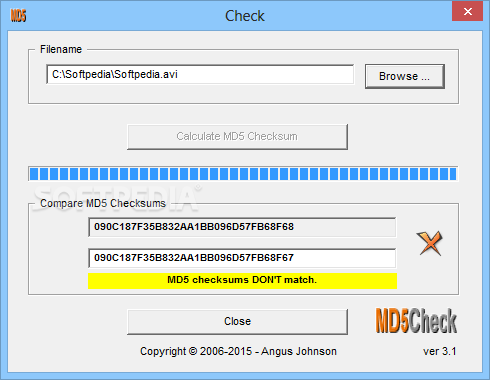

- Windows md5 checksum install#
- Windows md5 checksum windows 10#
- Windows md5 checksum password#
- Windows md5 checksum windows 7#
- Windows md5 checksum download#
Windows md5 checksum password#
for us on the breadline with little to offer the bad actor except waste their time with low level banking and a handle on good password provision. so if you are a bad actor target, a high degree of care and consideration are wise.
Windows md5 checksum download#
For your average download this is perfectly acceptable using MD5 “But” if your downloading Nuclear Codes, which I hope the average punter is not in the habit of doing, you might find this a little insecure of a consideration for MD5 and better routes to movement of that information would be a sound approach. Nothing is totally secure so security works on degrees of Risk. I would agree with the fact that MD5 while having been broken, does not make it useless. CertUtil followed by diff HASH1 HASH2 will let you easily compare the two hashes. MD5 & SHA1 are still the winners in this situation, for obvious reasons, not useless at all. Windows Server) has MD5/SHA1 values posted on the download site, but no clue as to where one might start, etc.
Windows md5 checksum install#
That’s a “lifesaver” knowing that ‘Windows Server’ too has the ‘CertUtil’ applet built-in.įor example, the ISO of updates that I need to install there (i.e. The built-in tool can also generate SHA256/384/512 hashes mentioned in the article you linked to – so there is value in knowing that you don’t have to install yet another third-party application to achieve this. Yes, it’s not a bulletproof process, a hacker could in theory change both the file and the corresponding hash, but in that scenario all bets are off anyway! If an MD5 hash is provided then this is a simple way to check it against the downloaded file. Many sites offer downloads and provide an MD5 hash to enable users to verify what they downloaded hasn’t been tampered with. The article you link to is essentially highlighting that MD5 is no longer secure and shouldn’t be used to store passwords – and I absolutely agree with that, but that’s not a point of my post. Thanks for your comment, but while MD5 may not be secure I think calling it ‘useless’ is going a bit far. If you’re reading this after 2005, note that md5 is now useless:

Glad you found the article useful – it’s difficult to keep up with what’s actually in Windows these days -).Īs for the mug, it was a present but I think it’s similar to this one: Įxactly Where I was coming from too – so thanks for this. Thank you! This solved my md5sum problem!Īlso, love the mug, where did you get it, if you don’t mind my asking. Thanks, it was a useful article! I’m glad Windows has a utility in their command line for this. Thank You, This Saved Me A Great Lot Of Time.Ĭool! I knew there must be a simple solution to compute checksums in windows without any third party tools. Open a command prompt and enter the following:Ĭomments Comments are now closed 28 responses
Windows md5 checksum windows 7#
Apparently it is also available in Windows 7 but I no longer have any systems running Win7 so I cannot verify that.
Windows md5 checksum windows 10#
Now, MD5 is not a new thing and you would think that Windows 10 would have some form of utility built in that would calculate the hash – and there is. Obviously each download was accompanied by it’s MD5 checksum so that I could verify the file but after freely installing all manner of utilities in the past I was a little bit wary this time around. If you Google for ‘MD5 checker’ you will see a number of utilities and while I have no reason to doubt the integrity of any of these I stopped short of installing any of them. The “problem” is which utility do you use to calculate the checksum of the downloaded file? But with a view to keeping this system as clean as I can I decided to make a point going forward of checking these checksums when they are available.

Now, I don’t always check these and maybe this is why my workstation ended up in a bit of a mess. Today I needed to install MySQL Workbench so I headed off to download it and noticed the MD5 checksum beneath the link. There could of course be multiple culprits. Previously I had all manner of applications, games (including Steam) and utilities installed and the chances of finding what was causing the problems was pretty remote. I recently paved my main development workstation after it started misbehaving (slow start up, some applications not opening consistently etc) and am trying to be careful about what I install on it going forward.


 0 kommentar(er)
0 kommentar(er)
